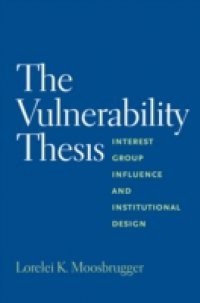Where politics is dominated by two large parties, as in the United States, politicians should be relatively immune to the influence of small groups. Yet narrow interest groups often win private benefits against majority preferences and at great public expense. Why? The vulnerability thesis is that the electoral system is largely to blame, making politicians in two-party systems more vulnerable to interest group demands than politicians in multiparty systems. Political scientist Lorelei Moosbrugger ranks democracies on a continuum of political vulnerability and tests the thesis by examining agrochemical policy in Austria, Britain, Germany, Sweden, and the European Union.

